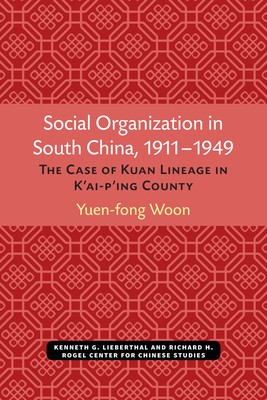
- We will send in 10–14 business days.
- Author: Yuen-Fong Woon
- Publisher: U of M Center for Chinese Studies
- ISBN-10: 0892640480
- ISBN-13: 9780892640485
- Format: 15.2 x 22.9 x 1 cm, minkšti viršeliai
- Language: English
- SAVE -10% with code: EXTRA
Reviews
Description
Bridging the collapse of the Confucian state and the establishment of the People's Republic of China, the period 1911-49 is particularly fascinating to historians, anthropologists, sociologists and political scientists. Unfortunately, it is also a very confusing period, full of shifts and changes in economic, social, and political organizations. The social implications of these changes, and the relationships between officials on the subdistrict level, the unofficial leaders, and the bulk of the peasantry remain inadequately known. South China, which nurtured the Communist Party in its formative years, is a particularly interesting case. In this study I use the Kuan lineage of K'ai-p'ing as a case study to show the effects of demographic, economic, administrative, and educational changes after the Treaty of Nanking (1842) on patrilineal kinship as a principle of social organization in South China. [vii]
EXTRA 10 % discount with code: EXTRA
The promotion ends in 23d.11:46:36
The discount code is valid when purchasing from 10 €. Discounts do not stack.
- Author: Yuen-Fong Woon
- Publisher: U of M Center for Chinese Studies
- ISBN-10: 0892640480
- ISBN-13: 9780892640485
- Format: 15.2 x 22.9 x 1 cm, minkšti viršeliai
- Language: English English
Bridging the collapse of the Confucian state and the establishment of the People's Republic of China, the period 1911-49 is particularly fascinating to historians, anthropologists, sociologists and political scientists. Unfortunately, it is also a very confusing period, full of shifts and changes in economic, social, and political organizations. The social implications of these changes, and the relationships between officials on the subdistrict level, the unofficial leaders, and the bulk of the peasantry remain inadequately known. South China, which nurtured the Communist Party in its formative years, is a particularly interesting case. In this study I use the Kuan lineage of K'ai-p'ing as a case study to show the effects of demographic, economic, administrative, and educational changes after the Treaty of Nanking (1842) on patrilineal kinship as a principle of social organization in South China. [vii]


Reviews